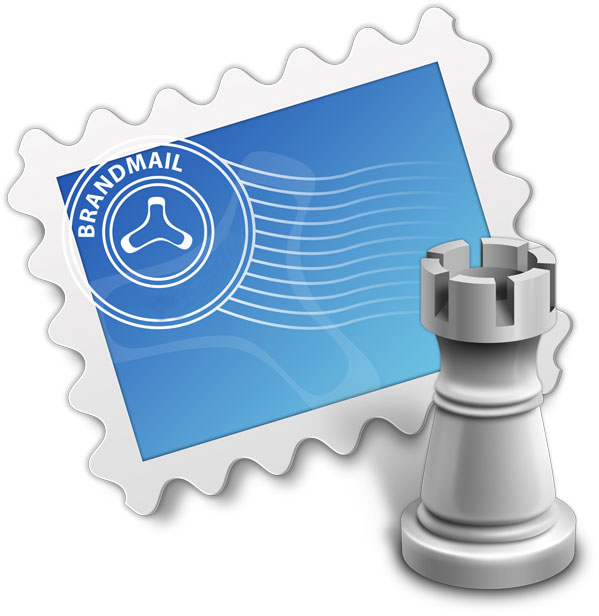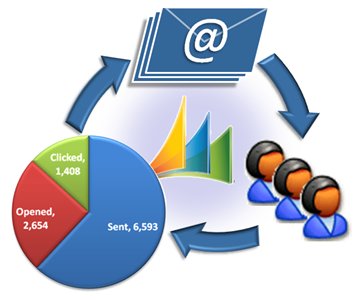
Email Marketing has reached a significant stage for business development and progress. Today, email is symbiotically tied to effective social media presence. Social networks have adopted their own inbox system, for example: Facebook and Twitter both have their own inboxes. In effect, individuals rely more on the messages obtained from these social media outlets rather than their inboxes simply because their Gmail, Yahoo! and Hotmail inboxes are reaching an overload. The consequence of this overload is simple: your audience fears their emails will be sold away to other companies intent on filling their inboxes with spam. This causes a chain reaction of untrustworthy, paranoid, and sceptical readership which believes that their anti-spam guards are not going to be enough against the onslaught of spam.
Email marketing has a dark side which depends on harvesting tools (scanning the web for email addresses, that is why you must never type your email address in full) intent on mass collection and dissemination. These tools are efficient, inexpensive, and very dangerous to your company`s overall reputation. In addition, these tools will not bring you positive results simply for one reason: those that you email will not become effective subscribers. If you do decide on taking the dark path, keep in mind that Microsoft and Google have begun developing powerful, intelligent, and very semantic anti-spam technologies to render your messages useless. Consider Microsoft`s Sender ID Framework:
“The Sender ID Framework (SIDF) is the leading e-mail authentication protocol. Created by Microsoft, with broad industry support, it helps protect more than 45 percent of all legitimate e-mail sent worldwide.” Source: Microsoft

The dark side continues to pump the internet with spam according to the Return Path “Top Email Trends in 2009″ (2010) study: “spam has increased over 141% since March and also found that spam volumes grow by over 117 billion e-mails a day”.
Email marketing is further complicated by image blockers, intelligent spam filtration technologies, as well as poor HTML rendering. Furthermore, individuals are less likely to click an email they have not condoned and so, they become uninterested in a product.
Email marketing relies on strong connections between you and the subscriber. With this relationship, they will not only purchase your products, but also recommend it to their friends. The visitor must come willingly to a website, read relevant content and subsequently want to subscribe to a newsletter. This is the only way to ensure that subscribers will produce results levelling and increasing a company`s revenues.
According to ExactTarget`s Email X-Factor Study (2010), “58% of people start their online day by reading emails”. Emails are a significant aspect of an individual`s life, for they comprise of relational dialectics, comprehensive communication, and rich exchange of information and knowledge. In a parallel study conducted by the Nielsen Company, “the dominance of email activity on mobile devices increased from 37.4% to 41.6% of US mobile Internet time”. Consequently, businesses have begun to invest significantlyinto email marketing and newsletter campaigns according to JupiterResearch (2010).
The only way to get a individual`s attention to your newsletter and subsequently become a part of your email marketing campaign is to offer free and/or promotional products according to ExactTarget`s (2010) study: “67% of US internet users say the motivation behind giving their email address to a company is to receive discounts and promotions”. In effect, you are facilitating a connection for your product and rendering their business for certain. Pursuing an email campaign can have tremendous benefits, especially if your company also has an office. According to Econsultancy`s “How We Shop in 2010: Habits and Motivations of Consumers” (2010), “42% of consumers said the best way to receive ads for sales and specials is via email” and subsequently, your special offers become the connection for a relevant subscriber–with their email subscription, they`ll be compelled to visit your store or your website to purchase the product. These statistics suggest that there is a lot of money using this method.
Best Practices and Standards
In order to achieve a successful online marketing strategy, consider utilizing the following best practises and standards for 2011 in order to obtain a clean reputation, a “cool” reception and relationships with your potential subscribers. Email marketers are doing the following behaviour in order tomaximize ROI, subscriber engagement, and subscriber confidence in their products.
1. Social Media
A cross-syndication of your presence on several or the most popular networks are a must in order to make real-time conversations, provide immediate feedback, and build a relationship. Above all, the email newsletter campaign cannot exist without a relationship. Email marketers can no longer blast a mass email and hope for replies, they must be done with the needs of the subscriber in mind.
2. Segmentation
You need to personalize your subscribers, follow a guideline to make sure that your subscribers are not getting the same generic message. Using informal dialogue, colourful text, and an easily readable content will go far with your audience. Remember, not all of your subscribers behave the same, or have similar needs. Through segmentation, you will be able to gather effective analysis.

3. Testing
It is always recommended to test your newsletter to ensure that it is being delivered properly, accurately, and that all your images and HTML are rendering appropriately. You must also ensure that analytical code is embedded in the email to ensure effective tracking and behaviour of the subscriber with the email.
4. Crossing Technologies
Not only must your newsletter be friendly to their email client, they must also be readable through other devices. Knotice (2011) reported that “13.36% of emails are opened by a mobile operating system or device” and that “US mobile-commerce revenues are expected to double in 2010, reaching $2.4 billion” (Coda Research Consultancy, 2010). Ensuring effective cross-technological syndication may be the livelihood of your entire organization.
Email Marketing tools
There are a number of email newsletter campaign services. They provide flexibility, customizability, and most importantly-analytics. Below you will find a list of tools and services that can help you optimize and improve your Email Marketing campaign.
1. StreamSend
One of the products I highly recommend is StreamSend`s email marketing services. The customer support and overall newsletter and plugin templates are incredibly flexible, easily modified, and carefully coded with excellent documentation. While expensive for most individuals, these services are important.
2. Tribulant`s WordPress Newsletter
My other highly recommended product is Tribulant`s WordPress Newsletter Plugin (3.0 Compatible). This is significantly a cheaper option compared to StreamSend and much swifter with customer support in my opinion. Not only do they include frequent updates, but they also have a developer`s license in case you want to install this service on potential clients. Tribulant has an excellent reception, terrific reviews, and in my opinion, the best option to go when being faced with this daunting task of attracting newsletter campaigns. This software keeps meticulous records, easily configured at the coding level, and can easily be set up with templates.
3. MailChimp
Your next option is of course the free service called MailChimp. In my experience, MailChimp is not very user-friendly, it`s too cluttered, and too messy to navigate. Overall, MailChimp is not intuitive enough at the coding level unlike Tribulants Newsletter Plugin. Furthermore, MailChimp is not so easily understood, lots of places one later discovers “oh, I didn`t know it was there”.
4. ThemeForest
Of course the email marketer will be interested in templates, so I highly suggest visiting ThemeForest for these. These templates are exceptionally documented and incredibly customizable. They come with precise instructions and are easily integrated with Tribulant`s aforementioned product. I am currently using the “Fresh Newsletter” option, but, according to Themeforest, there are 170 potential newsletter templates you can choose.
While there are several other ways one can develop their email newsletter campaigns, the most important connecting all of these four standards and trends is simply relationship-building through social media. Our suggestion is to use the above tools, be creative, experiment but stay whitehat in order to avoid damaging your online reputation.




No comments:
Post a Comment